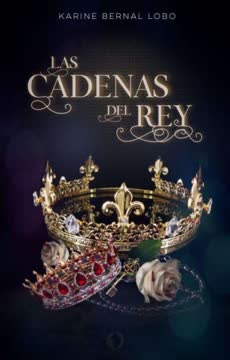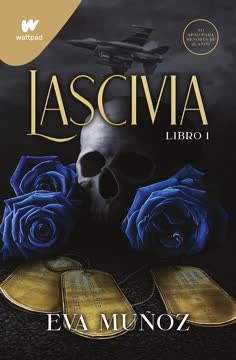Plot Summary
1. Cadenas Invisibles
Emily Malhore, joven mishniana, sobrevive como prisionera en el palacio de Mishnock, encadenada por el amor obsesivo del rey Stefan. Su vida es una rutina de encierro, vigilancia y fingimiento, mientras la política y la guerra entre reinos la rodean. La noticia de un ataque a Lacrontte, el reino enemigo, sacude su mundo y la impulsa a buscar la libertad. Emily, aunque rota y vigilada, planea su huida, sabiendo que su vida está marcada por las cadenas invisibles del poder, el amor tóxico y la traición.
2. Fuga Bajo Sombras
Con la ayuda de aliados discretos, Emily ejecuta un plan de fuga durante la coronación de Stefan. Drogando al rey y fingiendo afecto, logra salir del palacio y adentrarse en el bosque Ewan, guiada por Mendo, un hombre curtido en la clandestinidad. El viaje es brutal: trampas, disparos, muerte y miedo la acompañan hasta la frontera con Lacrontte. Herida y despojada, Emily cruza hacia el reino enemigo, dejando atrás su pasado y prometiéndose encontrar una vida digna, aunque un trozo de su corazón siempre pertenezca a quien la rompió.
3. Entre Reinos y Ruinas
En Lacrontte, Emily se enfrenta a la desolación de una ciudad marcada por la guerra y la desconfianza hacia los forasteros. Sin recursos, encuentra refugio en un comedor comunitario, donde se reencuentra con Vanir, una antigua rival. Aceptando la ayuda de Vanir, Emily se instala en su casa, pero pronto descubre que nada es gratis: Vanir la utiliza como mensajera para llegar al rey Magnus, su exnovio. Emily, atrapada entre favores y amenazas, debe navegar la política y las pasiones de un reino que no la quiere, mientras busca un lugar donde pertenecer.
4. El Precio de la Libertad
Emily se ve envuelta en intrigas palaciegas cuando Vanir la traiciona, entregándola a la Guardia Civil. Solo la astucia y la información valiosa sobre el rey Silas le permiten negociar su permanencia en Lacrontte. El rey Magnus, frío y calculador, le concede un permiso de residencia a cambio de trabajo forzado en el palacio. Emily, aunque libre de Mishnock, descubre que la libertad en Lacrontte tiene un precio: su dignidad, su tiempo y su capacidad de confiar.
5. Refugios y Traiciones
Mientras Emily se adapta a su nueva vida, la tensión con Vanir y el desprecio de la corte la persiguen. El rey Magnus, enigmático y herido, la obliga a leer para él cada noche, creando una extraña intimidad entre ambos. La llegada de la reina madre y la necesidad de fingir una relación para proteger secretos familiares sumergen a Emily en un juego de apariencias, donde cada gesto puede ser interpretado como traición o lealtad. La frontera entre enemigo y aliado se difumina, y Emily debe decidir en quién confiar.
6. El Rey y la Prisionera
Obligada a fingir ser la novia del rey Magnus durante una visita a Cromanoff, Emily se ve envuelta en una red de mentiras, celos y recuerdos dolorosos. La cercanía forzada despierta sentimientos contradictorios: atracción, resentimiento y una inesperada complicidad. El pasado de ambos, marcado por traiciones y pérdidas, sale a la superficie, y la línea entre el deber y el deseo se vuelve cada vez más difusa. Emily y Magnus, enemigos por nacimiento, descubren que el verdadero cautiverio es el de los sentimientos no confesados.
7. Pactos y Promesas Rotos
De regreso en Lacrontte, Emily y Magnus continúan su juego de poder y seducción, mientras la política de los reinos los arrastra a negociaciones de paz y alianzas forzadas. La llegada de viejos amores y la revelación de secretos familiares ponen a prueba su incipiente relación. Emily, desgarrada entre la lealtad a su pueblo y la atracción por el rey enemigo, debe decidir si puede confiar en un hombre que ha hecho del orgullo y la venganza su bandera. Las promesas se rompen tan fácilmente como se hacen, y el precio de la paz puede ser el corazón de ambos.
8. Nieve, Fuego y Deseo
En medio de la guerra y la desconfianza, Emily y Magnus se rinden a la pasión. La nieve de Cromanoff es testigo de su primer beso, un acto prohibido que sella un pacto tácito entre ambos. El deseo, el dolor y la ternura se entrelazan en noches de confesiones y caricias, mientras el mundo exterior se desmorona. Sin embargo, la felicidad es efímera: la política, los celos y las heridas del pasado amenazan con destruir lo que apenas comienza a nacer.
9. El Juego de la Reina
Las mujeres de la corte, desde Vanir hasta Lerentia y Gretta, juegan sus propias partidas en la sombra de los reyes. Emily se convierte en pieza clave de alianzas y venganzas, utilizada y traicionada por quienes ven en ella una amenaza o una oportunidad. La rivalidad, la sororidad y la ambición se entrelazan en un tablero donde el amor es solo otra forma de poder. Emily aprende que, para sobrevivir, debe ser tan astuta como sus enemigas y tan fuerte como sus deseos.
10. Amores y Abismos
Emily y Magnus exploran los límites de su relación, enfrentando sus miedos, inseguridades y el peso de sus historias. El amor se revela como un abismo: puede salvar o destruir, liberar o encadenar. Entre confesiones, caricias y peleas, ambos descubren que la verdadera libertad solo es posible cuando se atreven a ser vulnerables. Pero el pasado no perdona, y las heridas abiertas amenazan con arrastrarlos a la ruina.
11. El Arte de la Huida
Emily, cansada de ser moneda de cambio entre reyes, planea una nueva huida. Con la ayuda de inesperados aliados, logra escapar de la vigilancia de Stefan y Lerentia, solo para descubrir que la libertad es un espejismo cuando el corazón sigue atado. El viaje la enfrenta a sus propios límites, a la soledad y al miedo, pero también a la posibilidad de un futuro sin cadenas. Sin embargo, el pasado la persigue, y la redención parece cada vez más lejana.
12. El Dolor de la Verdad
La búsqueda de Nahomi, la abuela perdida de la reina, saca a la luz secretos que cambian el destino de todos. Emily descubre que la verdad puede ser tan dolorosa como la mentira, y que las lealtades se forjan y se rompen en los momentos más inesperados. Atelmoff, el consejero, revela su propio pasado de amor y sacrificio, mientras los reyes luchan por mantener el control en un mundo que se desmorona. La verdad, como la libertad, tiene un precio.
13. El Reino de las Mentiras
Magnus, atrapado entre el deber y el deseo, toma decisiones que lo alejan de Emily y de sí mismo. El juego de la política exige sacrificios, y el rey se convierte en prisionero de sus propias mentiras. Emily, herida y desilusionada, debe reconstruirse lejos de él, aprendiendo a distinguir entre el amor verdadero y la manipulación. Ambos descubren que el mayor enemigo no es el otro, sino las cadenas que se han impuesto a sí mismos.
14. El Valor de la Pérdida
Separados por el orgullo y la traición, Emily y Magnus enfrentan el vacío de la pérdida. La ausencia se convierte en maestra, enseñándoles el valor de lo que han dejado ir. Emily, refugiada en su familia, busca sentido en la rutina y en el amor de los suyos, mientras Magnus, devastado, comprende que el poder y la venganza no llenan el hueco que ella dejó. El dolor se transforma en fuerza, y ambos deben decidir si están dispuestos a arriesgarse de nuevo.
15. El Último Juramento
Magnus, incapaz de olvidar a Emily, regresa una y otra vez, buscando el perdón que no cree merecer. Emily, más fuerte y cauta, exige pruebas y no palabras. El reencuentro es tenso, marcado por la desconfianza y el deseo. Solo cuando ambos se atreven a ser honestos consigo mismos y con el otro, la posibilidad de una segunda oportunidad se abre. El amor, como la libertad, es un acto de coraje y fe.
16. El Retorno del Rey
Magnus, dispuesto a todo por recuperar a Emily, renuncia al orgullo y se arrodilla ante ella, pidiéndole matrimonio frente a sus enemigos y aliados. La propuesta es un acto de poder y de humildad, una declaración de amor y de rendición. Emily, tras un largo viaje de dolor y autodescubrimiento, acepta, sabiendo que la libertad y el amor solo existen cuando se elige, no cuando se impone. Juntos, se preparan para gobernar un reino donde el pasado no se olvida, pero el futuro se construye de a dos.
17. La Redención de los Caídos
Emily y Magnus, ahora prometidos, enfrentan el desafío de construir una vida juntos en un mundo marcado por la guerra, la traición y la pérdida. La redención no es olvido, sino aceptación y transformación. Las cadenas del rey y de la prisionera se rompen solo cuando ambos se atreven a ser vulnerables, a perdonar y a amarse sin reservas. El final es un nuevo comienzo: imperfecto, pero libre.
Characters
Emily Malhore
Emily es el eje emocional y moral de la historia. Hija de perfumistas, criada en la calidez de una familia humilde, su vida da un vuelco al convertirse en prisionera y objeto de deseo de reyes y cortesanos. Su psicología está marcada por la lucha entre la sumisión y la rebeldía, el deseo de pertenecer y la necesidad de ser libre. Emily es empática, valiente y, a pesar de las traiciones, nunca pierde la capacidad de amar y de perdonar. Su desarrollo es el de una joven que aprende a poner límites, a exigir respeto y a elegir su propio destino, incluso cuando el amor la pone en peligro.
Magnus VI Lacrontte Hefferline
Magnus es un rey forjado en el dolor, la culpa y la soledad. Marcado por la muerte de sus padres y la presión de un reino que exige perfección, su psicología oscila entre la frialdad calculadora y la pasión desbordada. Es orgulloso, controlador y, al mismo tiempo, vulnerable ante el amor de Emily. Su desarrollo es el de un hombre que debe aprender a soltar el poder para poder amar, a pedir perdón y a aceptar que la redención solo es posible cuando se es honesto consigo mismo y con el otro.
Stefan Denavritz
Stefan es el antagonista íntimo de Emily: un hombre que confunde el amor con la posesión, que justifica la violencia y el control en nombre del cariño. Su psicología es la del dependiente emocional, incapaz de soltar y de aceptar el rechazo. A lo largo de la historia, Stefan se convierte en el espejo oscuro de Magnus, mostrando lo que ocurre cuando el poder se usa para encadenar y no para liberar.
Atelmoff Klemwood
Atelmoff es la figura paterna que Emily encuentra fuera de su familia. Inteligente, astuto y profundamente ético, su lealtad está siempre con las personas, no con los títulos. Es el guardián de secretos que pueden cambiar el destino de los reinos, y su psicología está marcada por el sacrificio y la culpa. Su desarrollo es el de un hombre que, a pesar de sus errores, busca siempre el bien de quienes ama.
Vanir Etheldret
Vanir es la encarnación de la ambición y la inseguridad. Rival de Emily, exnovia de Magnus, su psicología es la de quien busca validación a través del poder y la belleza. Capaz de traicionar y de ayudar, Vanir es un personaje complejo, movido por el miedo a la irrelevancia y el deseo de ser amada. Su desarrollo es el de una mujer que, al final, debe enfrentarse a las consecuencias de sus propias decisiones.
Francis Modrisage
Francis es el ancla moral de Magnus y, por extensión, de la historia. Su psicología es la del mentor: paciente, observador y siempre dispuesto a decir la verdad incómoda. Es el único capaz de confrontar al rey y de guiarlo hacia la redención. Su desarrollo es el de un hombre que, habiendo perdido mucho, encuentra en la guía de los jóvenes su propósito y su redención personal.
Lerentia Wifantere
Lerentia es la esposa de Stefan y rival de Emily. Su psicología está marcada por la ambición, el resentimiento y la necesidad de control. Es capaz de ayudar y de destruir, de amar y de odiar con la misma intensidad. Su desarrollo es el de una mujer que, al final, debe elegir entre el poder y la paz interior.
Gretta Tebeos
Gretta es el fantasma que persigue a Magnus: amiga de la infancia, primera amante y, finalmente, traidora. Su psicología es la del amor obsesivo que, al no ser correspondido, se convierte en destrucción. Gretta es la prueba de que el amor, cuando se tuerce, puede ser tan letal como la guerra.
Ansel Cournalles
Ansel es el personaje que encarna la ambigüedad moral de la política. Espía de Lacrontte en Grencowck y luego traidor por supervivencia, su psicología es la del hombre que hace lo necesario para sobrevivir, aunque eso signifique perderlo todo. Su desarrollo es el de quien busca redención, pero sabe que algunas heridas nunca sanan.
Nahomi Pantresh
Nahomi es la madre de la reina Genevive y abuela de Stefan. Su psicología es la de la mujer que ha sobrevivido a la violencia y al exilio, que guarda secretos capaces de cambiar el destino de los reinos. Es la encarnación de la sabiduría y la resiliencia, y su desaparición es el catalizador de la búsqueda de verdad y justicia.
Plot Devices
Dualidad de Cadenas: Amor y Poder
La novela utiliza la metáfora de las cadenas para explorar cómo el amor, el poder y la política pueden ser tanto fuerzas liberadoras como opresoras. Emily y Magnus, aunque enemigos, están encadenados por sus historias, sus traumas y sus deseos. El encierro físico de Emily es reflejo del encierro emocional de Magnus, y solo al romper sus propias cadenas pueden aspirar a la libertad y al amor verdadero.
Narrativa de Espejos y Contrastes
La estructura de la novela se apoya en la dualidad y el contraste: Mishnock vs. Lacrontte, amor vs. obsesión, libertad vs. control, traición vs. lealtad. Los personajes principales son espejos distorsionados unos de otros, y sus decisiones revelan tanto sus fortalezas como sus debilidades. El uso de escenas paralelas (huida, encierro, traición) refuerza la idea de que todos, en algún momento, somos prisioneros de algo o de alguien.
Juego de Identidades y Secretos
La identidad es un tema central: Emily debe fingir, ocultar y reinventarse para sobrevivir. Los secretos familiares, las traiciones políticas y las mentiras personales son motores de la trama. El descubrimiento de la verdadera abuela de Stefan, la doble vida de Atelmoff y las motivaciones ocultas de Magnus y Vanir son revelados gradualmente, usando el suspense y la ironía dramática para mantener la tensión.
Redención y Perdón como Clímax
La estructura narrativa culmina en la búsqueda de redención: Magnus debe pedir perdón y renunciar al orgullo, Emily debe aprender a perdonar y a confiar de nuevo. El clímax no es una batalla física, sino emocional: la propuesta de matrimonio es tanto un acto de poder como de humildad, y solo es posible cuando ambos personajes han aceptado sus errores y están dispuestos a empezar de nuevo.
Simbolismo de las Flores y el Color
Last updated:
FAQ
0. Synopsis & Basic Details
What is Las cadenas del rey about?
- A Captive's Quest for Freedom: "Las cadenas del rey" follows Emily Malhore, a young woman held captive in Mishnock by the obsessive King Stefan. Her journey begins with a desperate escape to the enemy kingdom of Lacrontte, seeking a life free from the invisible chains of toxic love and political manipulation.
- Intrigue in Enemy Territory: Once in Lacrontte, Emily navigates a treacherous world of courtly intrigue, unexpected alliances, and the enigmatic King Magnus, who becomes both her reluctant protector and a new source of emotional turmoil. The narrative explores her struggle for independence amidst shifting loyalties and hidden agendas.
- Love, War, and Self-Discovery: The story delves into complex themes of love, betrayal, and self-discovery against a backdrop of ongoing inter-kingdom conflicts. Emily's path is one of resilience, as she confronts her past, challenges her perceptions of good and evil, and ultimately redefines what freedom and belonging truly mean.
Why should I read Las cadenas del rey?
- Deep Psychological Exploration: The novel offers a profound dive into the characters' inner worlds, particularly Emily's and Magnus's, revealing their complex motivations, hidden vulnerabilities, and emotional evolution under extreme pressure. Readers will find themselves deeply invested in their psychological journeys.
- Masterful Narrative Intrigue: Karine Bernal Lobo weaves a intricate plot filled with subtle foreshadowing, unexpected twists, and moral ambiguities that keep readers constantly guessing. The story challenges conventional notions of hero and villain, offering a nuanced exploration of power, loyalty, and personal sacrifice.
- Rich Thematic Depth: Beyond the romance and adventure, the book explores universal themes such as the true cost of freedom, the nature of obsession, the possibility of redemption, and the enduring impact of trauma. It prompts reflection on how past wounds shape present choices and the transformative power of genuine connection.
What is the background of Las cadenas del rey?
- Feudal Monarchies & Political Strife: The story is set in a world dominated by powerful, often absolutist, monarchies (Mishnock, Lacrontte, Grencowck, Cristeners, Dinhestown) locked in long-standing conflicts. The political landscape is defined by shifting alliances, territorial ambitions, and a constant undercurrent of war, influencing every character's life and decision.
- Technological & Social Contrasts: The setting blends elements of a pre-industrial era (carriages, gas lamps, traditional perfumeries) with hints of emerging technologies (trains, advanced military transport). Socially, it highlights rigid class structures (nobles vs. commoners), the importance of lineage, and the pervasive influence of courtly gossip and public perception.
- Cultural Nuances & Family Legacies: Each kingdom possesses distinct cultural traits, from Mishnock's perfumery tradition to Lacrontte's austere architecture and Cristeners' aesthetic focus. Family legacies, both noble and humble, play a significant role, shaping characters' identities, expectations, and the burdens they carry, as seen in Emily's family business and Magnus's inherited responsibilities.
What are the most memorable quotes in Las cadenas del rey?
- "El amor destruye tanto como la guerra." (Chapter 38): This powerful quote, spoken by Magnus, encapsulates a central theme of the novel, highlighting the destructive potential of love when it becomes obsessive or manipulative, mirroring the devastation caused by physical conflict. It reflects the bitter lessons both Emily and Magnus learn about relationships.
- "Eres todo aquello que no estaba buscando, pero que necesitaba encontrar." (Chapter 35): Magnus's confession to Emily reveals his profound internal shift, acknowledging her unexpected and vital role in his life. This quote marks a pivotal moment in their evolving relationship, signifying a reluctant acceptance of emotional vulnerability.
- "No importa lo que hagas ni la distancia que pongas entre nosotros: no la vas a separar de mí." (Chapter 31): Stefan's defiant declaration to Magnus underscores his deep-seated obsession with Emily, portraying his possessive love as an unbreakable chain. It highlights the relentless nature of his pursuit and the central conflict Emily faces in seeking true freedom.
What writing style, narrative choices, and literary techniques does Karine Bernal Lobo use?
- Intimate First-Person Perspective: The narrative primarily employs Emily's first-person point of view, offering direct access to her internal thoughts, emotional turmoil, and evolving perceptions. This creates a strong sense of empathy and allows readers to experience her journey of self-discovery and resilience firsthand.
- Sensory and Emotional Immersion: Bernal Lobo's prose is rich in sensory details, particularly olfactory (perfumes, scents) and tactile (cold, warmth, touch), immersing the reader in Emily's immediate experiences. The writing excels at conveying raw emotions, from fear and anger to unexpected tenderness and desire, making the characters' internal struggles palpable.
- Dialogue-Driven Character Revelation: Character development is heavily driven by dialogue, often revealing subtext, hidden motivations, and power dynamics. The witty, often sharp, exchanges between Emily and Magnus, in particular, serve to build their complex relationship, showcasing their intelligence, stubbornness, and growing attraction through verbal sparring.
1. Hidden Details & Subtle Connections
What are some minor details that add significant meaning?
- Stefan's Unopened Escape Box: In Chapter 1, Emily recalls Stefan sending a box with a new identity and plans to escape to Dinhestown, which she discarded. This seemingly minor detail reveals Stefan's initial, albeit misguided, desire for a shared future and highlights Emily's tragic missed opportunity for a different kind of freedom, deepening the irony of her later escape.
- The "Durian" Comment: When Vanir first encounters Emily in Lacrontte (Chapter 3), she insults Emily's appearance by comparing her smell to a "durian," a fruit Emily doesn't recognize. This subtle detail underscores Emily's sheltered upbringing in Mishnock, contrasting sharply with Vanir's worldly knowledge and highlighting Emily's initial naiveté in the broader, more complex world.
- Magnus's Scars and Their Significance: Throughout the book, Magnus's physical scars, particularly the "eleven" on his chest and back (Chapter 23) and the new "twelfth" one (Chapter 35), are more than just physical marks. They symbolize his past traumas, the burdens of his kingship, and the emotional wounds inflicted by betrayal, making his vulnerability to Emily more poignant.
What are some subtle foreshadowing and callbacks?
- Nahomi's Cryptic Prophecies: Nahomi's seemingly nonsensical pronouncements about "enredaderas" (vines) and "the sea" (Chapter 15, 46) subtly foreshadow the complex web of deceit surrounding Silas and the true identity of Queen Genevive's mother. Her "delusions" are later revealed as veiled truths, hinting at deeper secrets and the manipulative nature of power.
- Magnus's Aversion to Touch: Early in their interactions, Magnus is shown to be uncomfortable with physical touch, even washing his hands after accidentally touching Emily (Chapter 5). This subtle detail foreshadows his deeply ingrained emotional repression and past trauma, making his later physical intimacy and possessiveness towards Emily (Chapter 25, 35) a significant indicator of his evolving feelings and trust.
- The "Sempiterno" Bracelet: Stefan's gift of a bracelet engraved with "Sempiterno" (Chapter 17) is a direct callback to the locket he gave Emily earlier, symbolizing his broken promise of eternal love. Emily's act of throwing it away (Chapter 27) is a powerful symbolic release of her past emotional chains, marking a definitive break from Stefan's influence.
What are some unexpected character connections?
- Atelmoff's Secret Love for Queen Genevive: It is subtly revealed that Atelmoff, Stefan's loyal advisor, has a deep, unrequited love for Queen Genevive, Stefan's mother (Chapter 48). This connection explains his unwavering loyalty to the royal family, his protective stance towards Emily (whom he sees as a surrogate daughter), and his willingness to defy Stefan for the Queen's well-being.
- Francis's Relationship with Aidana: Francis, Magnus's stern advisor, is revealed to be in a secret, affectionate relationship with Aidana, Magnus's grandmother (Chapter 45). This unexpected connection humanizes Francis, showing a softer side to his character and providing a personal reason for his deep loyalty and concern for Magnus's happiness beyond mere duty.
- Ansel Cournalles's Past as Magnus's Spy: Ansel, initially presented as Aldous's loyal advisor, is revealed to have been Magnus's spy in Grencowck, later forced to betray Magnus (Chapter 26). This complex history explains Magnus's intense hatred for him and adds a layer of tragic irony to Ansel's attempts to befriend Emily, as he is a victim of the same political machinations.
Who are the most significant supporting characters?
- Nahomi Pantresh: Beyond being Queen Genevive's mother, Nahomi serves as a living prophecy and a symbol of hidden truths. Her "delusions" are actually cryptic warnings, and her concealed identity is the ultimate leverage Silas holds over his wife, making her disappearance the central mystery driving the plot's latter half. Her character highlights the theme of truth obscured by power.
- Ansel Cournalles: Ansel is crucial not only for his direct involvement in the attacks on Lacrontte but also as a mirror to Emily's own forced betrayals. His backstory as a double agent, marked by Magnus's branding, underscores the brutal consequences of political maneuvering and the moral compromises individuals are forced to make for survival.
- Atelmoff Klemwood: More than just a loyal advisor, Atelmoff acts as a moral compass and a surrogate father figure for Emily. His deep, unrequited love for Queen Genevive and his secret efforts to protect her and Emily reveal a profound sense of duty and compassion that transcends political allegiances, making him a quiet but powerful force for good.
2. Psychological, Emotional, & Relational Analysis
What are some unspoken motivations of the characters?
- Magnus's Need for Control and Vulnerability: Beyond his stated desire for revenge against Silas, Magnus's consistent need to control Emily, even in intimate moments (e.g., demanding she say his name, dictating her movements), stems from his own deep-seated trauma and fear of vulnerability. His desire for her obedience is a coping mechanism for a past where he felt powerless.
- Stefan's Desire for Validation: Stefan's obsessive pursuit of Emily, even after marrying Lerentia, is driven by a profound need for validation and control, mirroring the oppressive influence of his father, Silas. His "love" for Emily is intertwined with his need to prove his power and worth, especially after being constantly overshadowed and manipulated by his father.
- Lerentia's Hidden Jealousy: While Lerentia outwardly expresses disdain for Emily as Stefan's "mistress," her true unspoken motivation is a deep-seated jealousy of Emily's connection with Magnus. Her aggressive confrontations with Emily often occur when Magnus is present or mentioned, revealing her unfulfilled desire for the Lacrontte king's attention and affection.
What psychological complexities do the characters exhibit?
- Emily's Shifting Identity and Resilience: Emily grapples with a fragmented sense of self, constantly adapting to new roles (prisoner, refugee, fake girlfriend, spy). Her psychological complexity lies in her ability to maintain her core values (kindness, empathy) while developing a hardened exterior and strategic cunning, often surprising herself with her own capacity for defiance and manipulation.
- Magnus's Repressed Emotions and Trauma: Magnus is a study in emotional repression. His cold, arrogant demeanor is a defense mechanism against the profound grief and humiliation he experienced after his parents' death and the attack on Lacrontte. His struggle to express affection or vulnerability, and his tendency to resort to anger or control, reveal a deeply wounded psyche.
- Stefan's Cycle of Abuse and Control: Stefan's character embodies the psychological complexity of a victim who becomes an abuser. Having been controlled and manipulated by Silas, he perpetuates this cycle with Emily, believing his actions are justified by love. His inability to let go stems from a desperate need to exert power where he feels he has none.
What are the major emotional turning points?
- Emily's Realization of Stefan's Deceit: The moment Emily discovers Stefan fabricated her father's injury and the letters from her mother (Chapter 15) is a critical emotional turning point. It shatters her last illusions about Stefan's character and fuels her deep-seated resentment, solidifying her resolve to break free from him completely.
- Magnus's Confession of His Past Trauma: During their intimate moments, Magnus reveals the true extent of his childhood trauma, including the attack that scarred him and the loss of his parents (Chapter 23, 35). This vulnerability is a major emotional turning point, allowing Emily to see beyond his cold exterior and fostering a deeper, albeit complicated, empathy and connection between them.
- The "Betrayal" in the Carriage: Magnus's orchestrated "betrayal" of Emily in the carriage (Chapter 38), where he feigns disinterest and returns her to Stefan, is a devastating emotional turning point for Emily. It pushes her to the brink of despair, forcing her to confront her deepest fears of abandonment and worthlessness, ultimately strengthening her resolve to fight for her own agency.
How do relationship dynamics evolve?
- Emily and Magnus: From Antagonism to Complex Love: Their relationship begins with Emily as Magnus's prisoner and enemy, marked by distrust and verbal sparring. It gradually evolves through forced proximity, shared vulnerabilities, and unexpected moments of tenderness, culminating in a passionate, yet complicated, love built on mutual respect and a shared understanding of pain.
- Stefan and Emily: From Obsession to Resentment: What began as a childhood crush for Stefan transforms into a suffocating obsession, turning Emily into his captive. Their dynamic deteriorates into one of deep resentment and betrayal, with Emily actively seeking to escape his control and Stefan desperately clinging to a love that no longer exists.
- Magnus and Francis: Mentor, Confidant, Conscience: Francis evolves from Magnus's strict tutor and advisor into his most trusted confidant and moral compass. Their relationship is characterized by Francis's unwavering loyalty and his unique ability to challenge Magnus's decisions, often pushing him towards emotional honesty and more ethical choices, even when it's difficult.
4. Interpretation & Debate
Which parts of the story remain ambiguous or open-ended?
- Nahomi's True Intentions and Abilities: While Nahomi's "delusions" are revealed to be veiled truths, the full extent of her prophetic abilities and her precise role in the larger political game remain somewhat ambiguous. Her motivations for not directly revealing Silas's secrets earlier, and her ultimate fate, are left to reader interpretation.
- The Future of the Kingdoms: Despite the peace treaty and the defeat of Aldous, the long-term stability of the remaining four kingdoms is uncertain. The novel concludes with a new alliance, but the deep-seated animosities and power struggles suggest that future conflicts are always a possibility, leaving the political landscape open-ended.
- The Depth of Magnus's Transformation: While Magnus clearly undergoes significant character development, the extent to which he has truly shed his "villain" persona and embraced genuine emotional connection remains debatable. His past actions and his inherent need for control suggest that his journey towards full redemption is ongoing, not complete.
What are some debatable, controversial scenes or moments in Las cadenas del rey?
- Magnus's Branding of Ansel Cournalles: The scene where Magnus marks Ansel with an "M" on his back (Chapter 29) is highly controversial. While presented as a consequence of Ansel's betrayal, it mirrors Aldous's own brutal actions and raises questions about Magnus's capacity for cruelty and whether his methods are truly different from those he despises.
- Magnus's Orchestrated "Betrayal" of Emily: The climax of Magnus's plan, where he feigns breaking Emily's heart to extract information from Stefan (Chapter 38), is deeply debatable. Readers might question the ethical justification of such emotional manipulation, even if it serves a "greater good" (defeating Silas), and whether it undermines the authenticity of his feelings for Emily.
Review Summary
Las cadenas del rey received mixed reviews. Many readers loved the romance between Emily and Magnus, praising their character development and chemistry. The book was described as addictive and emotionally engaging. Some appreciated Emily's growth, while others found her frustrating. Magnus was a favorite for many, though some disliked his mood swings. Critics noted issues with pacing, repetitive drama, and unrealistic plot elements. Despite flaws, many readers eagerly anticipate the next installment in the series.
Similar Books
Download PDF
Download EPUB
.epub digital book format is ideal for reading ebooks on phones, tablets, and e-readers.










